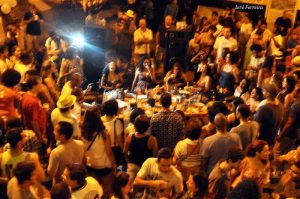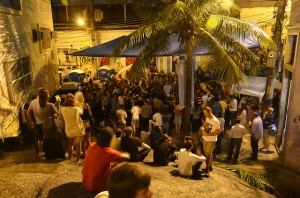The Cidade Maravilhosa is also dubbed the Cidade do Samba, or City of Samba, given that Rio de Janeiro, with its rich history, is the birthplace of samba music. For anyone spending time in Rio with an ear for music, hearing great authentic samba is almost unavoidable, but it helps to be willing to venture outside of Zona Sul (South Zone).

Traditional roda de samba or samba wheel is a distinct form of playing samba music involving a minimum of four people sitting around a table with a following of people singing along to songs that aren’t usually played commercially, referred to as samba de raiz, or roots of samba. They are often cross-generational affairs, as sambistas (samba musicians) typically start learning from their elders at an early age, perfecting the rhythm and song lyrics.
Components of samba music is predominately a 2/4 tempo varied with the conscious use of a sung chorus to a batucada rhythm, with various stanzas of declaratory verses. Traditionally, the samba is played on string instruments, mainly the cavaquinho guitar and various percussion instruments such as the tambourine and large drum, the surdo.
The location known as the birthplace of samba in Rio is Praça Mauá, located near the Port Zone. The square was a major trading ground for slaves brought from Africa, and it is here that legend puts the first samba beats. Close by, each Monday night at Pedro do Sal, is one of Rio’s most popular roda de sambas.
 It is free to attend, and the surrounding bars and restaurants remain open until late, as well as street food and beer for sale. During the summer months the event is also held on Friday evenings, and usually the closer to Carnival the bigger the gatherings.
It is free to attend, and the surrounding bars and restaurants remain open until late, as well as street food and beer for sale. During the summer months the event is also held on Friday evenings, and usually the closer to Carnival the bigger the gatherings.
Another great option is Samba do Trabalhador (Samba of the Worker), which takes place every Monday from 5PM to 10PM at Clube Renascença (Renaissance Club) in Zona Norte (North Zone). This is a well-attended event with legendary sambista Moacyr Luz taking the platform stage with his ten person band. It costs R$15 to enter and there is food and drinks for purchase.
An American musician from New York who has lived in Rio for over ten years, Scott Feiner, tells The Rio Times, “Although it’s a little bit out of the way if you’re located in Zona Sul, the Samba do Trabalhador is a great time. The musicians are all top-notch samba players and the leader is Moacyr Luz, one of Rio’s most important samba composers of his generation.”
For an intimate setting, every Saturday afternoon in Centro there is the Samba de Ouvidor (Samba of the Listener) gathering on the corner of Rua do Ouvidor and Rua Mercado. “We gather here because we come here to feel the music and feel the passion,” says Ivan Milanez, a known sambista in Rio who spoke to The Rio Times. “It is a family and we sing from the heart.”
http://riotimesonline.com/brazil-news/rio-entertainment/music/finding-the-best-roda-de-samba-in-rio/

Roda de Samba at Moça Prosa in Rio, photo courtesy of Divulgação.
Traditional roda de samba or samba wheel is a distinct form of playing samba music involving a minimum of four people sitting around a table with a following of people singing along to songs that aren’t usually played commercially, referred to as samba de raiz, or roots of samba. They are often cross-generational affairs, as sambistas (samba musicians) typically start learning from their elders at an early age, perfecting the rhythm and song lyrics.
Components of samba music is predominately a 2/4 tempo varied with the conscious use of a sung chorus to a batucada rhythm, with various stanzas of declaratory verses. Traditionally, the samba is played on string instruments, mainly the cavaquinho guitar and various percussion instruments such as the tambourine and large drum, the surdo.
The location known as the birthplace of samba in Rio is Praça Mauá, located near the Port Zone. The square was a major trading ground for slaves brought from Africa, and it is here that legend puts the first samba beats. Close by, each Monday night at Pedro do Sal, is one of Rio’s most popular roda de sambas.

A gathering at Pedra do Sal, birthplace of samba, photo by Alexandre Macieira/RioTur.
Another great option is Samba do Trabalhador (Samba of the Worker), which takes place every Monday from 5PM to 10PM at Clube Renascença (Renaissance Club) in Zona Norte (North Zone). This is a well-attended event with legendary sambista Moacyr Luz taking the platform stage with his ten person band. It costs R$15 to enter and there is food and drinks for purchase.
An American musician from New York who has lived in Rio for over ten years, Scott Feiner, tells The Rio Times, “Although it’s a little bit out of the way if you’re located in Zona Sul, the Samba do Trabalhador is a great time. The musicians are all top-notch samba players and the leader is Moacyr Luz, one of Rio’s most important samba composers of his generation.”
For an intimate setting, every Saturday afternoon in Centro there is the Samba de Ouvidor (Samba of the Listener) gathering on the corner of Rua do Ouvidor and Rua Mercado. “We gather here because we come here to feel the music and feel the passion,” says Ivan Milanez, a known sambista in Rio who spoke to The Rio Times. “It is a family and we sing from the heart.”
http://riotimesonline.com/brazil-news/rio-entertainment/music/finding-the-best-roda-de-samba-in-rio/





No comments:
Post a Comment